- Home
- Francine Rivers
The Scribe Page 2
The Scribe Read online
Page 2
The crew of soldiers strained at the task of turning the cross upside down.
The mob went quiet, and in that single moment Peter called out, his deep voice carrying up through the rows of spectators. “Forgive them, Father; they don’t know what they are doing.”
The Master’s words.
Tears had welled in Silas’s eyes.
It had taken all his will to stand in the arch in the upper corridor and keep his eyes fixed upon Peter in his suffering. “Pray when I face my death, Silas,” Peter had requested weeks before his capture. “Pray that I will remain faithful to the end.”
And so Silas had prayed, fiercely, determined, in anguish, in fear. Lord, if it ever comes to this for me, let me in faith endure to the end as Peter did. Do not let me recant what I know! You are the way, the truth, and the life. Lord, give my friend comfort in his agony. Lord, give Your beloved servant Peter strength to cling tightly to his faith in You. Lord, let him see You as Stephen did! Fill him with the joy of homecoming. Speak to him now, Lord. Please say those words we all long to hear: “Well done, my good and faithful servant.”
He was, Lord. Your servant Peter was faithful.
God, I beg of You, let this be the last execution I witness!
Last night Silas had awakened, certain he heard Paul’s voice dictating another letter. Relieved, joyous, he had jumped up. “Paul!” The dream was so vivid it took a moment for the truth to strike him. When it did, it felt like a physical blow. Paul’s dead.
Silas put his hands flat on the writing table. “You are the resurrection and the life.” He must remind himself. “The resurrection.” What were the words John had said when they last met in Ephesus? “Anyone who believes in Jesus will have . . .” No. That isn’t right. “Anyone who believes in God’s Son has eternal life.” Paul’s words echoed in his mind. “While we were utterly helpless, Christ died for us sinners.” John’s conviction cried out to him. “Love each other . . .”
A shout from outside made Silas stiffen. Were they coming for him now? Would he face another imprisonment, another flogging, more torture? If I try to escape suffering by telling them I’m a Roman citizen, will that make me a coward? It’s true, but I despise everything about this empire. I hate that even in the smallest way I’m part of it. Lord, I was strong once. I was. Not anymore . . .
Paul’s voice echoed again. “When I am weak, then I am strong. . . .”
Silas gripped his head. “You, my friend, not I . . .”
He could not think clearly here in the confines of Rome with the cacophony of voices, trampling feet, vendors’ cries. The mob, the ever insatiable mob on his heels. I have to get out of here! I have to get away from this place!
He scrambled to gather his writing materials and few possessions. The scrolls! He must safeguard the scrolls!
Heart pounding, Silas left the small, stifling room.
The proprietor spotted him the moment he came out the door, as though the man had been watching for him. “You there!” He crossed the narrow street. “You’re leaving?”
“My business here is finished.”
“You don’t look well. Perhaps you should stay a few more days.”
Silas glanced at him. The man cared nothing about his health. Money was all the man wanted—more money.
The noise of humanity seemed to grow louder around Silas. Wolf faces everywhere. Romulus and Remus’s offspring filled the street. Silas looked at the people milling about, talking, shouting, laughing, arguing. The poor lived here—huddled, hungry masses that needed so much more than food. They reeked of discontent, cursing one another over the least provocation. These were the people Rome appeased with blood sport. It kept their minds from dwelling on the lack of grain.
Silas looked into the proprietor’s eyes. Paul would have spoken the words of life to him. Peter would have spoken of Jesus.
“What?” The proprietor frowned.
Let him die, Silas thought. Why should I cast pearls before this pig? “Perhaps I’ve got the fever,” he said. “It swept through the village where I stayed a few weeks ago.” True enough. Better than saying, “I went to the games three days ago, and watched two of my closest friends executed. All I want now is to get as far away from this wretched city as I can. And if the whole population of Rome is sucked down to hell, I will stand and shout praises to God for their destruction!”
As Silas expected, the proprietor drew back in alarm. “Fever? Yes, you must go.”
“Yes, I must.” Silas smiled tightly. “Plagues spread quickly in narrow streets, don’t they?” Especially the plague of sin. “I paid for a week, didn’t I?”
The man blanched. “I don’t remember.”
“I didn’t think you would.” Silas shouldered his pack and walked away.
After several days of walking, Silas reached Puteoli. He did not have the stamina he once had, nor the heart.
He made his way to the harbor and wandered in the marketplace. Where do I go from here, Lord? Semaphores flashed, signaling the arrival of grain ships, probably from Egypt. Workers hurried past him, hastening to unload sacks of grain, carry them to the mensores for weighing. Other vessels anchored farther out, lenuncularii operating tenders between ship and shore. Merchandise came from all over the empire to satisfy the Roman markets: corn, cattle, wine, and wool from Sicily; horses from Spain; slaves from Britannia and Germania; marble from Greece; multicolored rugs from Asshur. The port was a good place to lose himself and still find what he most needed.
The scents made Silas’s head swim: salt-sea air, animal dung, spices, wine, and human sweat. Seagulls screeched overhead as fish were piled on a cart. Criers shouted goods for sale. Sheep bleated from holding pens. Wild dogs from Britannia snarled from crates. Foreign slaves stood naked on platforms, sweating in the sun as they were auctioned. One fought against his bonds while a woman and child were pulled away. Though he shouted in a strange language, his anguish was well understood. The woman’s weeping turned to hysterical screams as her child was wrenched from her. She tried to reach him, but was dragged in another direction. The child wailed in terror, arms outstretched toward his mother.
Throat tight, Silas turned away. He couldn’t escape injustice and misery. It was all around him, threatening to suffocate him. The seed of sin planted centuries ago in the Garden of Eden had taken root and spread its shoots of wickedness everywhere. And all feasted on this poisonous fruit that would bring them nothing but death.
It was late afternoon when he saw a familiar symbol carved into a post of a booth filled with barrels of olives and baskets of pomegranates, dates, figs, and nuts. His stomach growled. His mouth watered. He hadn’t eaten anything since leaving The Three Taverns two days ago.
He listened to the proprietor bargain with a woman. “You know these are the best dates in all the empire.”
“And you know I cannot pay such a high price.”
Neither shouted nor grew vitriolic, a common occurrence in marketplaces. She made an offer; he countered. She shook her head and made another offer. He laughed and made yet another. When they reached agreement, the proprietor grabbed a handful of dried dates and put them on his scale. He wrapped them in a cloth the woman handed him and received payment. As she walked away, he turned his attention to Silas. “Olives? Dates?”
Silas shook his head. He had spent his last coin on bread. He looked at the symbol carved into the pole. Had this grinning pirate put it there? Before he could find a way to ask, the man cocked his head and frowned. “I know you. Don’t I?”
“We’ve never met.”
“You look familiar.”
Silas’s heart pounded. He thought of turning away, but where would he go? “I am a friend of Theophilus.”
The man’s eyes cleared. “Ah!” He grinned. “How is he these days?”
“Not well.” Silas took a step back, thinking he might have made a mistake in saying anything to this man.
The merchant glanced one way and then the other and beckoned Silas close
r. “Silas. Is that not your name?”
Silas blanched.
“Do not look distressed, my friend,” the man said quickly. He dropped his voice. “I heard you preach once, in Corinth. Years ago—five, maybe six. You look tired. Are you hungry?”
Silas couldn’t answer.
The man grabbed some dates and figs and pressed them into Silas’s hand. “Go to the end of the street; turn left. Follow that street to the end. It will wind like a serpent before you reach your destination. Pass two fountains. Take the first street on the right just after. Knock on the door of the third house. Ask for Epanetus.”
Could he remember all that, or would he find himself wandering Puteoli all night? “Whom shall I say sent me?”
“My apologies. In my excitement at meeting you, I forgot to introduce myself.” He laughed. “I’m Urbanus.” He leaned forward and said gruffly, “You are an answer to many prayers.”
Silas felt the weight of the man’s expectations. “Peter is dead.”
Urbanus gave a solemn nod. “We heard.”
So soon? “How?”
“Bad news travels fast. Our brother Patrobas arrived day before yesterday. He could not find you in the catacombs.”
Patrobas. Silas knew him well. “I feared someone might follow and others be taken.”
“We feared you had been arrested.” Urbanus grasped Silas’s arms. “God has answered our prayers. You are well. We did not expect the added blessing of your presence here.”
Blessing? This man remembered his face from one encounter. What if others, enemies, also recognized him as Peter’s scribe? His presence might endanger these brothers and sisters.
Lord, will all we’ve worked for be destroyed in a bloodbath?
Urbanus leaned closer. “Do not look so troubled, my friend. Puteoli is a busy city. Everyone has an eye to business and little else. People come; people go.” He repeated the directions, slowly this time. “I would show you the way myself, but I cannot entrust my booth to others. They’re all thieves . . . just as I once was.” He laughed again and slapped Silas on the shoulder. “Go. I will see you later.” He called to a group of women passing by. “Come! See what good olives I have! The best in the empire!”
Urbanus did not lie. Two dates and a fig took the sharp edge of hunger away, and they did taste better than anything Silas had eaten in Rome. He kept the rest in the pouch tied to his belt.
The day was hot, and Silas felt sweat trickle down his back as he walked. Merchants’ booths gave way to streets lined with tenements. Shoulders aching, he shifted his pack. Over the years, he had carried far heavier loads than this, but the weight of the scrolls seemed to increase with every step.
A servant opened the door when he knocked. The Ethiopian’s inscrutable gaze took Silas in from dusty head to sandaled feet.
“I am looking for the house of Epanetus.”
“This is the house of Epanetus. Who may I tell my master is come?”
“A friend of Theophilus.”
The servant opened the door wider. “I am Macombo. Come. Enter in.” He closed the door firmly behind Silas. “Wait here.” He strode away.
It was the house of a rich man. Pillared corridors and frescoed walls. An open court with a white marble statue of a woman pouring water from an urn. The sound of the water made Silas realize his thirst. He swallowed hard and longed to shrug the pack from his shoulders and sit.
Footsteps approached—the hurried slap of sandals. A tall, broad-shouldered man strode across the courtyard. His short-cropped hair was gray, his features strongly carved. “I am Epanetus.”
“Urbanus sent me.”
“Which Urbanus would that be?”
Caution was to be expected. “From the agora.” Silas opened his pouch and took out a handful of plump dates.
Epanetus laughed. “Ah, yes. ‘The best dates and figs in all the empire.’” He extended his hands. “You are welcome here.”
Silas received the greeting, knowing his own response was somewhat less enthusiastic.
“Come.” Epanetus gave a quiet order to Macombo and then led Silas across the court, through an archway, and into another area of the house. Several people sat in a large room. Silas recognized one of them.
Patrobas came swiftly to his feet. “Silas!” Grinning broadly, he came to embrace him. “We feared you were lost to us.” He drew back and kept one hand firmly on Silas’s arm as he addressed the others. “God has answered our prayers.”
They surrounded him. The heartfelt greetings broke down Silas’s last defenses. Shoulders sagging, he bowed his head and wept.
No one spoke for a moment, and then they all spoke at once.
“Pour him a little wine.”
“You’re exhausted.”
“Sit. Have something to eat.”
“Macombo, set the tray here.”
Patrobas frowned and guided Silas. “Rest here.”
When someone took hold of his pack, Silas instinctively gripped it tighter. “No!”
“You are safe here,” Epanetus said. “Consider my home yours.”
Silas felt ashamed. “I must safeguard these scrolls.”
“Put the pack here beside you,” Patrobas said. “No one will touch it unless you give permission.”
Exhausted, Silas sat. He saw nothing but love and compassion in the faces surrounding him. A woman looked up at him, eyes welling with tears. Her concern pierced him. “Letters.” He managed to shrug the pack from his shoulders and set it down beside him. “Copies of those Paul sent to the Corinthians. And Peter’s.” His voice broke. Covering his face, he tried to regain control and couldn’t. His shoulders shook with his sobs.
Someone squeezed his shoulder. They wept with him, their love leaving no room for embarrassment.
“Our friend is with the Lord.” Patrobas’s voice was thick with grief.
“Yes. No one can harm him or his wife now.”
“They stand in the Lord’s presence as we speak.”
As I long to be, Silas wanted to cry out. Oh, to see Jesus’ face again! To have an end of trials, an end to fear, an end to the attack of doubt when he least expected it. I am losing the battle inside myself, Lord.
“We must hold firm to that which we know is true.”
Paul’s words, spoken so long ago. They had been sitting in a dungeon, darkness surrounding them, their bodies laced with pain from a brutal whipping. “Hold fast,” he had said.
“I’m trying,” Silas moaned.
“What is he saying?”
Silas mumbled into his hands. “Jesus died for our sins and was raised from the grave on the third day. . . .” But all he could see was the Lord on the cross, Paul beheaded, Peter crucified. He pressed the heels of his hands into his eyes.
“He’s ill.”
“Shhhh . . .”
“Silas.” A firm hand this time, a Roman hand. A tray laden with food was set before him. Epanetus and Patrobas encouraged him to eat. Silas took bread in trembling hands and tore it. This is My body. . . . He held the two halves, shaking. “Do I dare eat of it?”
Whispers of concern.
Epanetus poured wine into a cup and held it out to him. “Drink.” Silas stared at the red fluid. This is My blood. . . . He remembered Jesus on the cross, blood and water pouring from the spear wound in His side. He remembered Peter hanging upside down.
Pain gripped his chest. His heart raced faster and faster. The room grew dark.
“Silas!”
He heard the roaring of the Roman mob. Hands grabbed hold of him. So be it, Lord. If I die, there will be an end of suffering. And rest. Please, Lord. Let me rest.
“Silas . . .” A woman’s voice this time. Close. He felt her breath on his face. “Don’t leave us. . . .”
Voices above and around him, and then no sound at all.
Silas roused, confused. A clay lamp burned on a stand. Someone came close. A cool hand rested on his brow. Silas groaned and closed his eyes. His throat squeezed tight and hot.
Something warm and sweetened with honey.
“A little more. It will help you sleep.”
Silas remembered and struggled to rise. “Where are they? Where . . . ? The letters!”
“Here.” Macombo lifted the pack.
Silas took it and clutched it close, sighing as he lay back on the bed.
“No one will take anything from you, Silas.”
Voices came and went, along with dreams. Paul spoke to him across a campfire. Luke dressed his wounds. They sang as they followed the Roman road. He awakened to footsteps and fell asleep again. Paul paced, agitated, and Silas shook his head. “If you will but rest, my friend, and pray, the words will come.”
Voices again, familiar now. Macombo and Epanetus.
“To whom does he speak?”
“I don’t know.”
“Silas . . .”
He opened his eyes. A woman stood with the sunlight at her back. When she came close, he frowned. “I don’t know you.”
“I’m Diana. You’ve been sleeping a long time.”
“Diana . . .” He tried to remember. He had seen her face, but where?
She put her hand on his shoulder. “I’ll just sit with you awhile.”
“How is he?” Epanetus spoke from somewhere close.
“He has no fever.”
“Pain?”
“His dreams trouble him.”
Time passed; how much, Silas didn’t know or care. He awakened again to voices in the corridor outside the room.
“It’s not just exhaustion that makes him sleep so long. It’s grief.”
“Give him time. He will find his strength in the Lord.”
Murmuring and then Macombo’s voice. “He seems little interested in food or drink.”
“I heard him speak in Corinth,” said Urbanus, the pirate merchant who sold the best dates in the empire. “He was magnificent. Think of the honor the Lord has bestowed on us by sending him here. Silas saw Jesus in the flesh.”
“And saw Him crucified.” Patrobas spoke with quiet firmness.
“And risen! We’ve only heard about the Lord. We never saw Him face-to-face. We never ate with Him or walked with Him. . . .”

 An Echo in the Darkness
An Echo in the Darkness A Lineage of Grace
A Lineage of Grace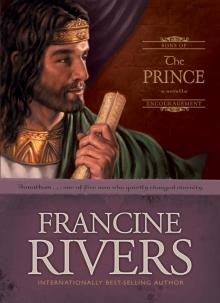 The Prince: Jonathan
The Prince: Jonathan Bridge to Haven
Bridge to Haven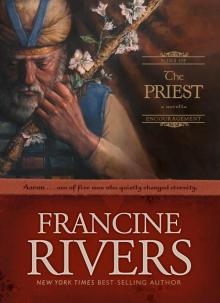 The Priest: Aaron
The Priest: Aaron Her Mother's Hope
Her Mother's Hope Redeeming Love
Redeeming Love The Scarlet Thread
The Scarlet Thread The Masterpiece
The Masterpiece The Last Sin Eater
The Last Sin Eater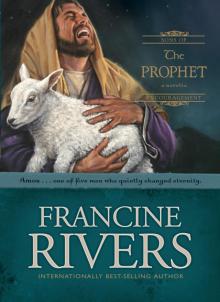 The Prophet: Amos
The Prophet: Amos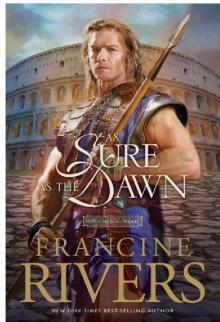 As Sure as the Dawn
As Sure as the Dawn Her Daughter's Dream
Her Daughter's Dream A Voice in the Wind
A Voice in the Wind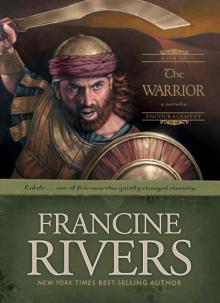 The Warrior: Caleb
The Warrior: Caleb The Scribe: Silas
The Scribe: Silas And the Shofar Blew
And the Shofar Blew The Atonement Child
The Atonement Child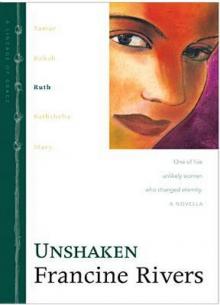 Unshaken_Ruth
Unshaken_Ruth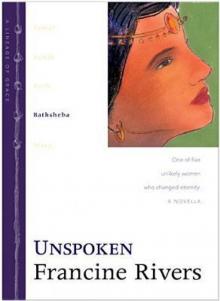 Unspoken_Bathsheba
Unspoken_Bathsheba The Scribe
The Scribe Sons of Encouragement
Sons of Encouragement The Shoe Box
The Shoe Box Sycamore Hill
Sycamore Hill Unafraid_Mary
Unafraid_Mary Marta's Legacy Collection
Marta's Legacy Collection